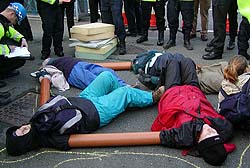
Nuclear Nonchalance
Activists take casual stroll aboard nuclear warhead-carrying submarine
19th November 2002
Two activists gained access to one of Britain's four nuclear warhead-carrying submarines and weren't discovered until they deliberately rang the ship's bell.
Petter Joelson and Elisa Sivenoinen, from the prolific Trident Ploughshares campaign group, boarded HMS Vanguard at Devonport Naval docks in Plymouth at 11.30pm on Nov 15. After strolling round the vessel for 30 minutes they deliberately rang the ship's bell and were arrested. The protest was designed to highlight the escalation of nuclear activities in a city with a population of 250,000 and to express vehement opposition against the UK's "weapons of mass destruction". For the authorities it was a highly embarrassing security breach at a time of supposed heightened terrorist alert, carried out by untrained peace activists.
Joelson and Sivenoinen were subsequently charged with damage to a fence valued at £250 and have been bailed to appear in Plymouth magistrates court on December 15.
Following the incident, Joelson said: "I can't see the logic of a situation where Tony Blair is threatening Iraq with war if they don't grant access to weapons inspectors, when at the same time we were arrested for a peaceful inspection of Britain's illegal weapons of mass destruction."
Trident Ploughshares' focus of attention has recently switched from the Rosyth and Faslane nuclear bases on the Clyde in Scotland to concentrate on Devonport Naval Docks in Plymouth. Now wholly owned and managed by the huge US corporation, Halliburton, Devonport is the home base of 12 nuclear powered submarines and is currently hosting a controversial eight year refit of the UK's four nuclear warhead-carrying submarines. HMS Vanguard is the first to be refitted and pulled into Devonport in February this year. Devonport Management Ltd, who run the docks on behalf of Halliburton, have successfully applied to the Environment Agency for permission to dramatically increase certain radioactive effluences into the local environment. (See 'Silent But Deadly' on the SQUALL features pages).
Trident Ploughshares activists also blocked the gates to Devonport Naval Docks on Nov 18. Seven female activists were arrested and charged with 'obstruction of the highway'.
The activists had support from both local residents and the Catholic bishop of Plymouth, Christopher Rudd, whose diocese stretches from the Scilly Isles to Bournemouth in Dorset. Rudd issued a statement supporting the activists: "I wish to express my solidarity with you in your endeavour to get nuclear weapons and other weapons of mass destruction banned from our planet."
Local residents in support of the Ploughshares' action reacted angrily to a statement made by Plymouth MP David Jamieson suggesting that the anti-nuclear campaign would take away people's jobs. "I am very angry at David Jamieson suggesting that our campaign will take away people's jobs," said Claire Devereaux, local resident and a Trident Ploughshares 'pledger'. "If the millions being spent on Trident each day was invested locally it would greatly ease the poverty in Plymouth and create many more opportunities for employment."
Employment prospects have long been used as a factor in support of Plymouth's escalating nuclear activities. However because of the high tech nature of the work there have in fact been very few jobs created by the expansion of the nuclear facilities. Having been a navy town since the 1500's, Plymouth's main source of employment is now mobile phone call centres.
David McKenzie, a spokesperson for Trident Ploughshares, said: "After Friday's astonishing security lapse people have been calling for head to roll. Let's make it clear - we do not want anyone in the base to be sacked. What we want is for the British government to take responsibility for its criminal nuclear weapons policy and its total disregard for people's safety."
Trident Ploughshares are a highly active anti-nuclear weapon campaign group who deploy vehemently non-violent protest techniques to draw attention to the hazard of nuclear arsenals. Activists from the group have broken into several naval and RAF bases round the UK and always wait to be arrested. Since they began in 1978, there have been 1,790 arrests, 366 trials, £49,945 of fines and compensation orders, and 1,675 days spent in prison mostly for refusal to pay fines.
Related Articles
Silent But Deadly - Investigation into nuclear subs, radioactivity and corporate dockyards - 26-April-2001
Sub Plots - Peace campaigners fined after demo at Devonport nuclear submarine base - 14-Aug-2002
Links
https://www.tridentploughshares.org *
* Wayback Machine link
